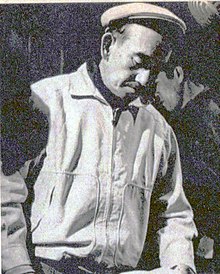Minoru Shibuya
Minoru Shibuya | |
|---|---|
 | |
| Born | 2 January 1907 |
| Died | 20 December 1980 (aged 73) |
| Occupation | Film director |
| Years active | 1937-1966 |
Minoru Shibuya (渋谷実, Shibuya Minoru, 2 January 1907 – 20 December 1980) was a Japanese film director.
Career[]
Born in Tokyo, Shibuya attended Keiō University but left before graduating.[1] He joined Shochiku in 1930 and worked as an assistant under Yasujirō Ozu, Mikio Naruse, and Heinosuke Gosho, before making his debut as a director in 1937.[2] Shibuya "worked with equal facility in comedy and melodrama, [and] made his mark as an ironic but compassionate chronicler of the difficulties of the early postwar period".[3]
One notable film was , which was supposed to be Ozu's next film before he died. But as the critic Chris Fujiwara notes, Shibuya's "films are a world apart from Ozu: harsh, sometimes strident, in tone, splashed with dark humor, tending to contort the human body or thrust it into the bottoms of violently modernist compositions".[3]
He directed over four dozen films between 1937 and 1966.
Selected filmography[]
- (ママの縁談) (1937)
- (母と子) (1938)
- Gendai-jin (現代人) (1952)
- (本日休診) (1952)
- Christ in Bronze (青銅の基督 Seidō no Kirisuto) (1956)
- (正義派) (1957)
- (悪女の季節) (1958)
- Mozu (もず) (1961)
- (好人好日) (1961)
- (酔っぱらい天国) (1961)
- (大根と人参 Daikon to ninjin) (1965)
References[]
- ^ "Shibuya Minoru". Nihon jinmei daijiten+Plus. Kōdansha. Retrieved 23 June 2011.
- ^ "Minoru Shibuya". Moving Image Source. Museum of the Moving Image. Retrieved 23 June 2011.
- ^ Jump up to: a b Fujiwara, Chris (9 February 2011). "Finished Business". Moving Image Source. Museum of the Moving Image. Retrieved 23 June 2011.
External links[]
- Minoru Shibuya at IMDb
- Shibuya Minoru at the Japanese Movie Database (in Japanese)
- 1907 births
- 1980 deaths
- Japanese film directors
- Japanese screenwriters
- 20th-century screenwriters